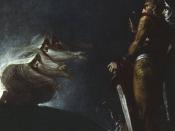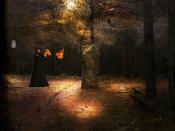Macbeth is a Shakespearean play written for a tragic audience about the fate of a man. Act three scene five introduces Hecate the Queen of Witchcraft. She is angry with the three sisters for conducting magic and prophecies towards Macbeth without including her. This scene is questioned by many on wether or not Shakespeare actually wrote Hecate's lines. They aren't Shakespearean sounding in the sense that they are in rhymed couplets instead of his famous iambic pentameter.
While Hecate speaks Shakespeare reiterates words and synonyms to emphasize the importance of her lecture toward three sisters. Because the weird sisters have angered Hecate, such words as saucy and overbold represent them. On the contrary, wayward, wisdom, grace, fear, confusion, and love are described of Macbeth. Macbeth is unpredictable for the killings, but when killing he uses grace and wisdom as to not be discovered. In the mean time he is in a sense of fear of discovery and confusion towards the future.
This passage in short sums up the story of the play.
Throughout the passage death is emphasized. This death is of Macbeth's family and close ones, and himself through insanity. The repetition of spells and charms are used to symbolize the importance of the witches ceremonies. Fate verse free will can be considered into the importance of this recurrence because the question remains, would Macbeth have killed if he never heard the fortune the witches had told him before? I don't think he would have because unless he had heard from someone he was to be king the throne would have just fallen into his lap.
Imagery is not expressed often because this is a direct opinion of a character which is not written to contain much hidden meaning in the sense of imagery. Though imagery is not used, a common theme is, evil and human nature. When Hecate says "...security/ Is mortal's chiefest enemy" she is speaking to deceive Macbeth. This illustrates human nature because Hecate is going to use fear to drive Macbeth insane and eventually to kill.
This is by far is the only passage written completely in rhymed couplets. Many scholars contradict if Shakespeare actually wrote because the difference in his style and the style of the passage. Even though most lines are rhymed the author uses sight rhyme in some cases such as are and dare, and fear and bear.
The writer uses linked words throughout the passage. Two allusions, Hecate and Acheron are the two most important though. Hecate is a Greek Goddess of the underworld. She represents night and witchcraft. Acheron is a river in Hades, which is also know as the underworld or where death is present. Both words are related by the underworld or death further exemplifying Hecate's cruel nature.
This scene depicts all of Shakespeare's writings with the style, but it is significant. The theme is not Shakespearean because of this dramatic change, although it does contain some stylistic characters of Shakespearean writing such as repetition, a common theme, and strong poetic devices.





